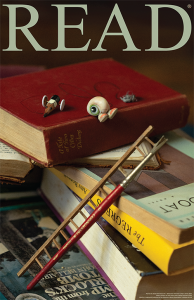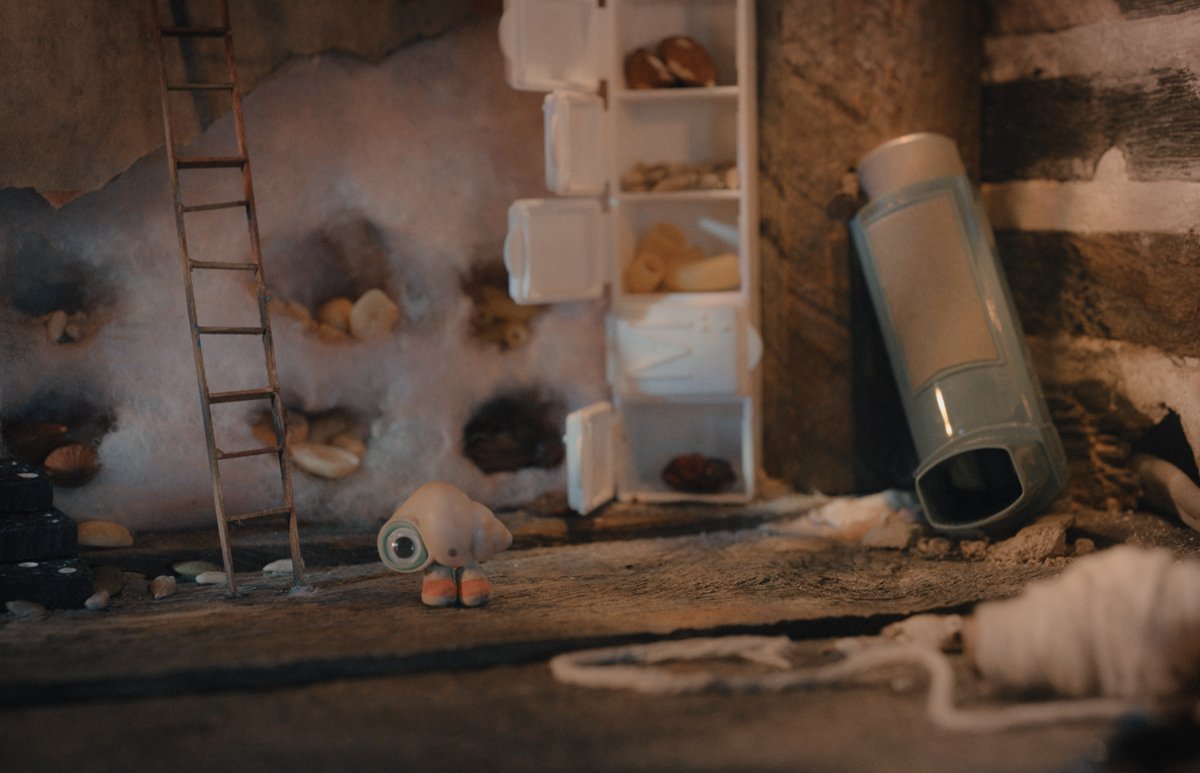Marcel the one-inch-tall shell became an internet sensation in a 2010 stop-motion animated short by director Dean Fleischer Camp and writer/actress Jenny Slate. Sequels and picture books followed, and now Marcel (voiced by Slate) is hitting the big screen-and an American Library Association (ALA) READ poster-in Marcel the Shell with Shoes On, a delightful film that follows Marcel and his grandmother Connie (voiced by Isabella Rossellini) and their pet lint, Alan. Once part of a sprawling community of shells, they now live alone as the sole survivors of a mysterious tragedy. When a documentary filmmaker (Fleischer Camp) discovers them, the short film he posts online brings Marcel millions of fans, as well as unprecedented dangers and a new hope of finding his long-lost family.
I Love Libraries spoke with Fleischer Camp and Slate recently about the film, its inspirations, their thoughts on libraries, and more.
What was the inspiration behind Marcel? Where did this distinct character and voice come from?
Jenny Slate: The voice was the first thing to arrive. I started doing it over a weekend, and we both thought it was funny. It was a voice I’d never done before, which is kind of astounding because I thought I had made every face and done every voice that I possibly could do. It just really did kind of pop up, and we both really liked how it sounded. It was kind of delightful. And then Dean had promised a friend that he would make a video for their stand-up show. He interviewed me, and we were having a conversation with the voice-it wasn’t even Marcel yet-answering questions about being small because the voice was saying that it was small.
After interviewing me as that voice for a little bit, Dean got some arts and crafts supplies-googly eyes, shells-and went to a toy store and bought a Polly Pocket and took the shoes off and made a bunch of different attempts at the character design. I remember I was out having lunch, and when I came back to the apartment there was this one little guy on the corner of the kitchen table. Dean was like, “This is him.” I really felt like, “Oh my God, it is him. He does look like that.” It was so exciting because I had never seen anyone that looks like Marcel. He’s really one of a kind, and he’s good looking in a way that really defines different standards of beauty. I love how he looks. I think he’s so beautiful.
Dean Fleischer Camp: He’s very ruggedly handsome.
Slate: He’s handsome for sure. And then Dean started to interview me again, and he just said, “What’s your name?” And for one reason or another, I just said, “My name is Marcel, and I’m partially shell, as you can see in my body.” And I was just describing what I saw and what I felt like.
The film is a perfect mixture of innocence and humor, but it’s also melancholic. It’s a family film, but it confronts existential topics like loss, loneliness, and death. Was it hard to find and maintain that balance; to make a film that wasn’t too heavy but also not fluffy and light?
Slate: I do think it was a challenge. That was one of the central challenges-not making it be a total bummer and not making it be something shallow that depended on Marcel and his cuteness as a gimmick. We wouldn’t want to do that either. It was the way that Marcel was created that he is linked to two live artists who have an instinct and have a personal inclination to create. We didn’t want to detach from the inclination to show a certain experience and certain combination of feelings that were in one way or another shared between both of us, even though we’re different people and have different experiences. It really is like constantly turning the hot and cold valve on a faucet; like really trying to keep the temperature right.
Fleischer Camp: We met when we were pretty young, and we first bonded over like work, whether it was comedy or movies or books. I think that we have a simpatico palate that we’re working with. We both love films and books where the antagonist is not a single evil person but is a truth of life or a sickness. There’s plenty of antagonism already in the world-you don’t need to make up a super villain. Studio Ghibli movies are incredible at that, and a lot of the books that we share a love for are like that as well.
Slate: We always liked [books and] storytelling that felt like the supplies were already there, you know? Good, beautiful descriptors and images that weren’t condescending but were satisfying and mature even though they were for young people. We tried hard in our picture books to honor Marcel by hiring a painter who made these beautiful oil paintings [for the illustrations].
How much of each of you is in Marcel and vice versa?
Fleischer Camp: I don’t want to speak for Jenny, but I suspect what we love about Marcel are the qualities that we like about each other.
Slate: I like to think of him as aspirational me; like how I would be if a lot of things weren’t imposed on me or if I weren’t convinced of some certain brutal beliefs. A lot of him feels like what is inside of me if I could be my most self-respecting self. But you know, I’m often not.
Fleischer Camp: I’m very inspired by his confidence. He is constantly confronted by these outsized obstacles, and he doesn’t see them as impossibilities. He doesn’t take it personally. He just knows that he has to overcome that new thing that just dropped in his path. And he’ll find a way, just like yesterday and just like tomorrow. We could all use a little bit of that.
Slate: Yeah, I like that. He doesn’t perform his identity. He doesn’t try too hard. He’s not manipulative. He really is how he is. And that makes me feel calm. I’m like, “Oh, people can be that way, where they’re just being themselves and not trying to have an experience that can be put on Instagram to tell people that they did something.” He really exists in a free way. He is free, and I like that.
One thing about the film that I loved was the miniature world that Marcel inhabits full of Rube Goldberg devices made from everyday household objects. How did you create this new world out of the familiar?
Fleischer Camp: You know, it was always something that I loved about his world. We both love books like Mary Norton’s The Borrowers and William Joyce’s George Shrinks, and those were sort of background inspirations. It was fun to think about how you would go about being a survivalist, because Marcel’s essentially stranded on a desert island. Except he’s not-he’s in a home, but that home was not made for him. It’s so much larger. So, it was fun to think of what he would use to get around or how he would climb on the walls.
We vetted the idea of him going to Hollywood or going to New York City or being lost in Paris, [but] those all felt so wrong. Because what’s lovely about Marcel is that he teaches us to look deep and not abroad and far. It felt like, “Oh, cool, keeping him in one location actually isn’t a huge constraint because he’s so little.” So, how does he get around? How does he do stuff? How does he get supplies? It was a fun challenge. And then there was the second step of that process which was making those things real. We worked with some incredible artists and craftspeople to construct those things. What’s beautiful about a project [like this] that has its heart in the right place is that all the people working on it were really trying to put their best ideas into it. I wish I could live there.
 Speaking of that little world, Marcel is now featured on an ALA READ poster that finds him perched on a stack of books. Dean, you were involved with the creation of the poster: What was that process like?
Speaking of that little world, Marcel is now featured on an ALA READ poster that finds him perched on a stack of books. Dean, you were involved with the creation of the poster: What was that process like?
Fleischer Camp: Jenny and I are fans of those posters, so it was an unbelievable dream that we got to make one for ourselves. It was such a nice opportunity to go back and look at all my favorite ones, like E.T. and…
Slate: David Bowie!
Fleischer Camp: Yeah, the David Bowie one is a favorite. I was flabbergasted and totally more than happy to do [the poster] myself. I have a bunch of the props and Marcel puppets left over from the production, so I took an afternoon and made a little set with books on the floor of my office in my apartment and asked a photographer friend of mine, Jeff Cohen, to shoot it.
Slate: It’s so nice. The colors are lovely.
Fleischer Camp: I also want to point out that in the poster [Marcel’s] sitting on my grandmother’s old copy of A Tale of Two Cities.
Do you have any fond memories of libraries from childhood that you can share?
Slate: In the town where I grew up, Milton, Massachusetts, the library always looked like a little castle to me. It was down the street from our house; not super close, but not far at all. I remember thinking of it as a grand place. I think a lot of people feel this way, but I like the way the library smelled. It was such a good smell to me-the books and the dust and the high ceilings and the air. That combination was unmistakable every time.
The library had two little carousels with VHS tapes on them, and that’s where we would get our videos. I remember you couldn’t get a library card until you could write your name, so when I could write my name, I got a library card and rented Brigadoon. I think [it’s] one of the reasons why my comedy is what it is; why I’ve always wanted to get on stage and be a comedian. I think of myself as an entertainer in the way that Gene Kelly is an entertainer. It was all that old-fashioned stuff, and it made a big impression on me. The way I do my comedy, which is definitely modern, is really influenced by all of that early entertainment.
I felt so cared for [at our library] because there was a children’s section. I knew it really well and knew the librarians. I loved the peaceful atmosphere. I liked being trusted with the books. Like, you are just allowed to take them out and you promise to take good care of them and bring them back. I love that whole thing.
Marcel the Shell with Shoes On opens in select theaters June 24 and nationwide on July 15. I Love Libraries has tickets to special sneak preview screenings on Wednesday, June 22, in select cities across the US. Seating is limited and based on a first-come, first-served basis. Seating is not guaranteed.
And don’t forget to get your own ALA READ poster featuring Marcel!




